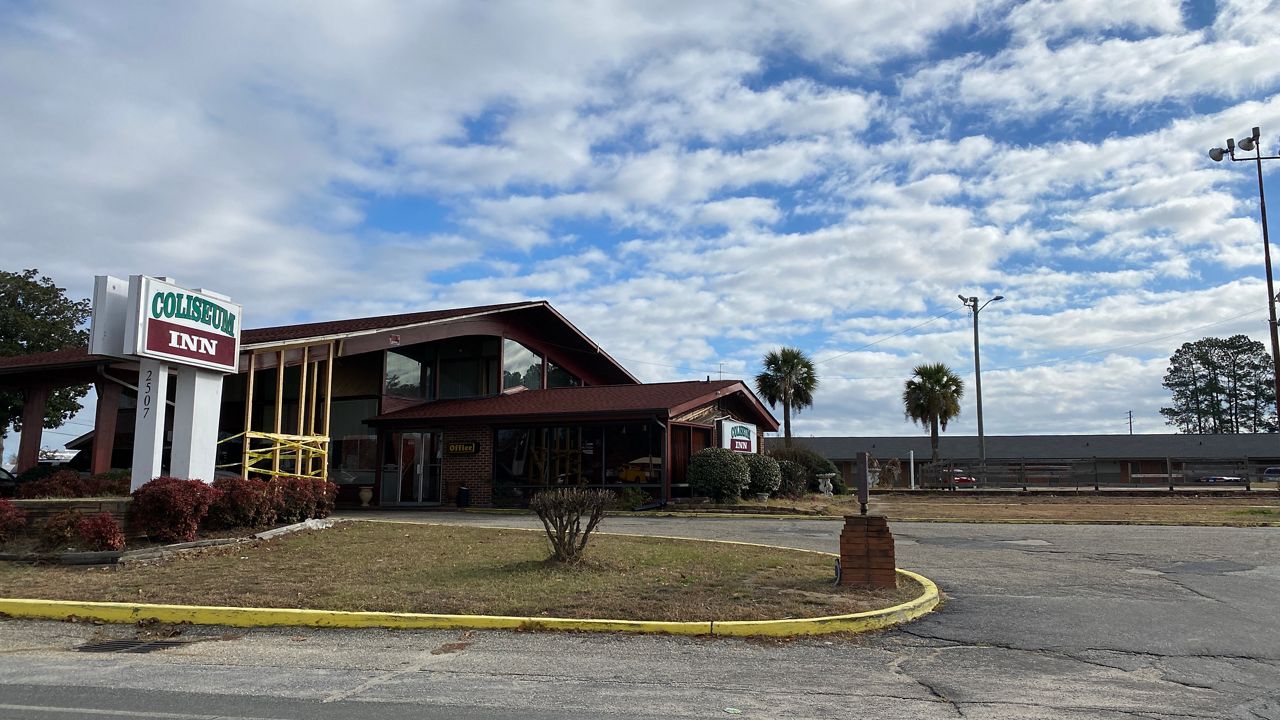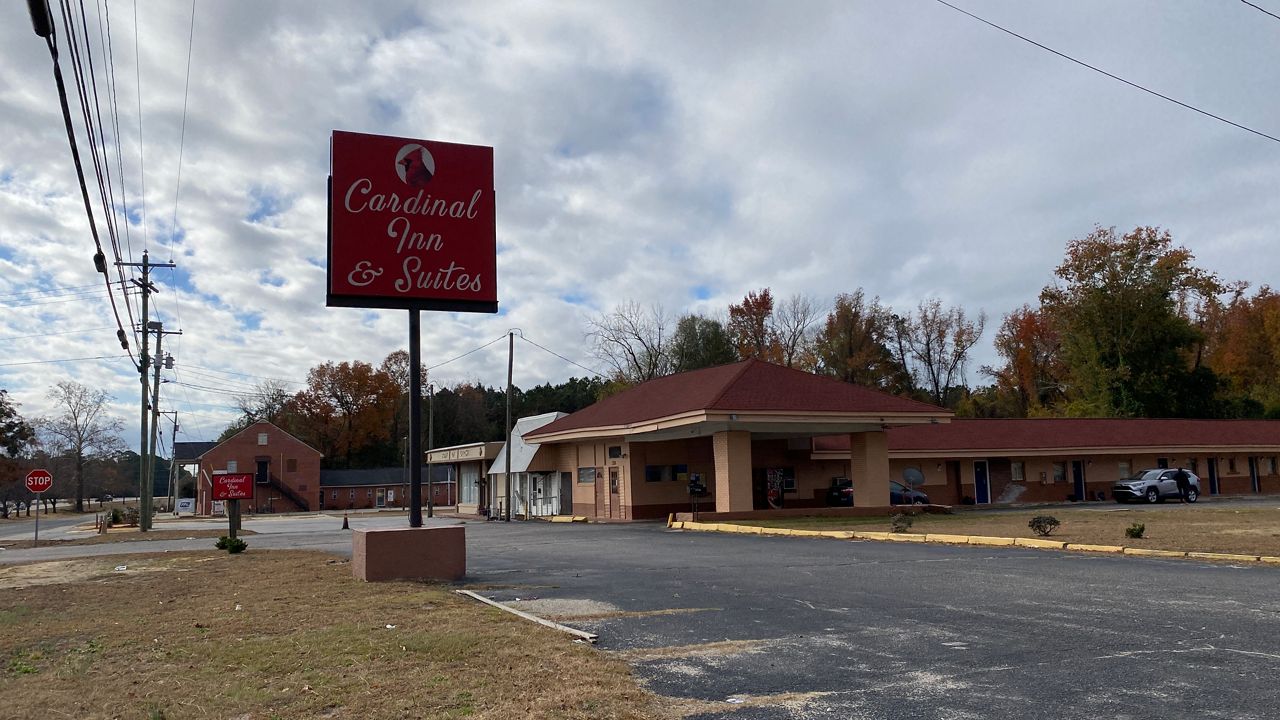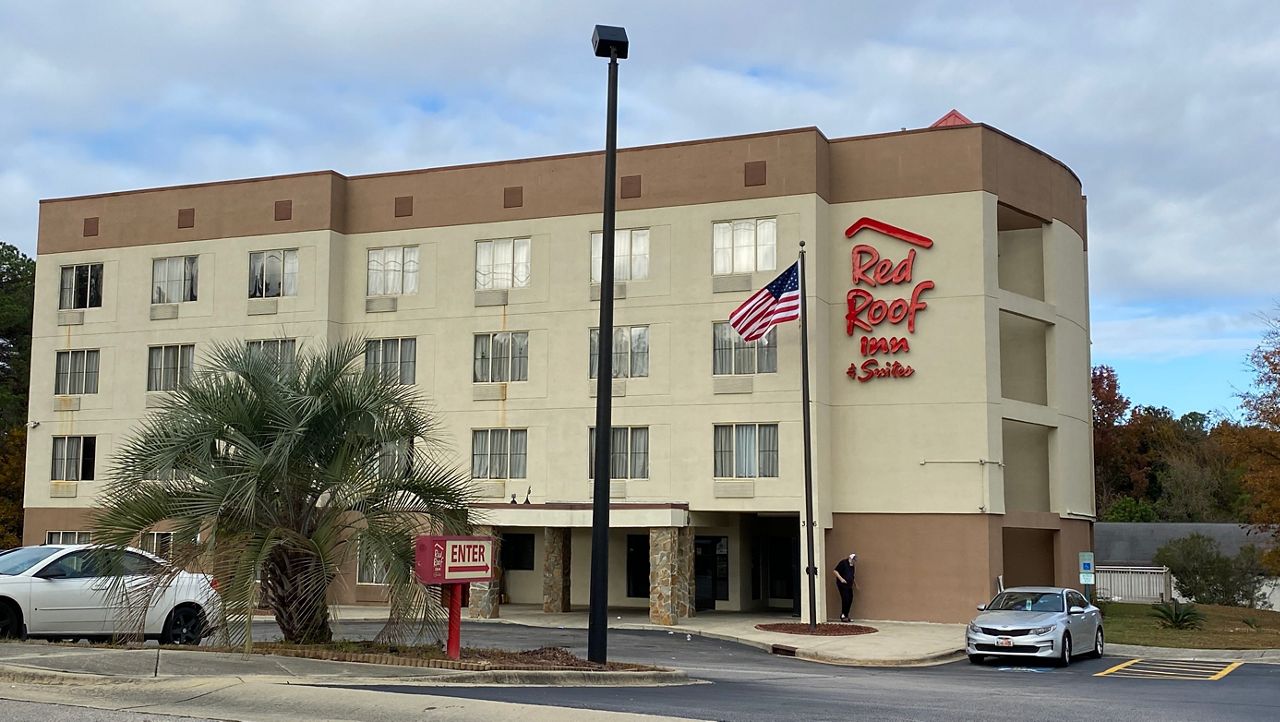FAYETTEVILLE, N.C. — The woman was forced into prostitution, imprisoned, drugged, abused and manipulated, a lawsuit charges. Two sex traffickers held her at a series of hotels and motels around Fayetteville, North Carolina, in 2019, making her perform sex acts with five to 10 men a day, the suit states.
Those hotels included a Red Roof Inn, Coliseum Inn, Cardinal Inn & Suites and others, according to the federal lawsuit filed last month in Raleigh. The woman, identified as Jane Doe, is suing the hotel owners, saying they knew, or should have known, about the abuse happening in their rooms.
The hotels should have known, the lawsuit states, “because Doe’s traffickers frequented the Defendants’ hotels and had multiple victims who were trafficked, coerced, drugged and threatened at this location.”
“Defendants financially benefited from the sex trafficking of Doe, and other victims like her, and developed and maintained business models that attracted and fostered the commercial sex market for traffickers and buyers alike,” the lawsuit alleges.
Federal and state law says businesses, like hotels that indirectly profit off sex trafficking, can be held liable.
“Human trafficking is a scourge across this country, and North Carolina is no different. The purpose of the lawsuit is to hold accountable those who benefit from this horrible practice. We look forward to seeking justice for our client,” Dexter Benoit, attorney for the woman, said in a statement.
But Dev Rajababoo, owner of the Cardinal Inn and Suites, said prostitution is common around his hotel. The motel is one of the places where the woman said she was held and forced to perform sex acts on customers.
The Cardinal Inn, just outside Fayetteville city limits, is a series of three brown single-story buildings. Motel room doors open to a central parking lot. Next door is the Body of Christ Christian Center.
This stretch of Highway 301 and Business 95 is dotted with similar budget motels. The Coliseum Inn, another motel listed in the lawsuit, is across the street.
There isn’t much he can do, Rajababoo said, except kick out customers who have high traffic in and out of their rooms.
“How do I know?” Rajababoo said in an interview with Spectrum News 1. “It’s not my job to stop or do anything about people who are there of their own free will.”
If the women didn’t complain or ask for help, what was he supposed to do, Rajababoo asked.
He said his hotel rents rooms for $280 to $300 a week. His customers, he said, include locals who can’t get a regular apartment because they don’t have the money for a deposit.

“I am not in the business of telling people what to do,” he said. “We do what we can, but we are not in the policing business.”
Many big hotel chains, like Mariott and Hyatt, have staff go through training on how to identify a possible sex trafficking victim.
Red Roof Inn puts employees through a 10-minute training instructing them on how to identify sex traffickers, said Shyam Patel, who manages the franchise hotel off Owen Drive in Fayetteville. He said the franchise’s corporate parent requires the training for all staff and managers.
He said he too kicks people out of the hotel if there is high traffic in and out of rooms.
Patel said his company took over the hotel in May 2021, after the woman in the lawsuit said she was held there.
The Coliseum Inn did not respond to phone calls seeking comment.
The woman sued the hotels under the William Wilberforce Trafficking Victims Protection Reauthorization Act of 2008.
There were 83 of these kinds of cases filed in federal courts in 2021, including cases over sex trafficking and forced labor, according to the Human Trafficking Institute. Seventeen of those were against hotels.
That 2008 act defined new human trafficking crimes and expanded the definitions of words like “force” to make the law stronger, according to the Department of Justice.
“Prior to 2000, the Department of Justice (DOJ) filed human trafficking cases under several federal statutes related to involuntary servitude and slavery, but the criminal laws were narrow and patchwork,” according to the DOJ.
“The way the statute is written, I’m really surprised there haven’t been more businesses, including hotels, to be sued,” said Pam Strickland, head of N.C Stop Human Trafficking. “The law is pretty clear that anyone who participates in trafficking someone, whether they’re the main party or not, that falls under the definition of trafficking.
“Some hotels have certainly not done all that they could to prevent and-or report cases of trafficking,” she said, without talking directly about the hotels listed in the lawsuit. “The hotel that comes up over and over again is the Red Roof Inn.”

Red Roof Inn runs franchise hotels. The parent company did not respond to questions left with a spokesman.
Both Patel and Rajababoo said they had never heard of the law before.
The outcomes in these types of lawsuits are mixed. A judge in Arkansas awarded $25 million to a woman in July, according to the Arkansas Democrat Gazette. She was underage when she was trafficked for three years, the newspaper reported.
But in a 2021 case, a federal judge in Denver threw out claims against a hotel there.
“There are also no allegations that plaintiff made a member of the staff at either hotel aware that she was being forced to engage in commercial sex activity, as opposed to engaging in commercial sex by choice," the judge wrote.
Big hotel chains developed trainings for staff on identifying sex trafficking victims in part because of these new federal laws.
“What it does is it gives red flags for things that hotel staff need to be aware of,” said Strickland, whose group trains law enforcement, school staff and other groups on identifying human trafficking.
“For instance, at the front desk, if there is an older man and he has one or more younger girls with him that don’t appear to be related to him, who maybe seem a little anxious or afraid or won’t make eye contact,” she said.
“They may be inappropriately dressed for their age or the weather or the circumstance,” she said.
Housekeeping staff could look for lots of sexual clothing in a room or lots of used condoms, Strickland said.
The lawsuit accuses the Fayetteville hotels of not adequately training workers.
“The Defendants have financially benefited as a result of these acts, omissions, and/or commissions by keeping rooms open, keeping operating costs low, and maintaining the loyalty of the segment of their customer base that seeks to participate in the sex trade,” the lawsuit states.
“Moreover, the Defendants directly benefited from the trafficking of Doe on each occasion they received payment for rooms that she was being kept in at the Defendants’ hotels,” according to the lawsuit.
The woman at the center of the lawsuit was 32 when she met a man, identified as Trafficker 1, at a co-worker’s housewarming party in November 2019, according to the complaint. They went to a hotel room together where the woman met a man identified as “Trafficker 2,” the leader of a gang, the lawsuit states.
“Trafficker 2 and Trafficker 1 sexually assaulted and physically abused Doe that same day. Doe was threatened by Trafficker 1 and Trafficker 2, who told her that both of her children would be murdered, and Doe would have to watch the murder of her children if she disobeyed Trafficker 1 or Trafficker 2’s orders,” according to the lawsuit.
Forced into prostitution, the traffickers listed Doe on websites known for advertising sex trafficking, the lawsuit said.
“Trafficker 1 and Trafficker 2 would use physical violence, forced drug use and physical drug addiction, as well as intimidation to force Doe to be trafficked five to ten times per day,” according to the lawsuit. This happened between November and December 2019, the lawsuit states. She said she lost 60 pounds in that time.
“Every time Doe interacted with Defendants’ staff, it was readily apparent that Doe was not at their property under her own volition, but instead was under the control of often brutal traffickers,” the lawsuit states.
“There were numerous and consistent red flags that were obvious to the hotel staff,” at each of the hotels listed in the lawsuit, according to the filing. Those red flags included visible signs of abuse, frequent linen changes, lots of used condoms in the trash cans, and an unusual number of male visitors going in and out of the rooms, the suit states.
It will now be up to the federal court, and potentially a jury, to decide if the hotels in Fayetteville hold some responsibility for Doe’s sexual exploitation and abuse over two months in 2019.



